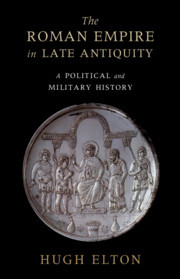Description
The Roman Empire in Late Antiquity
A Political and Military History
Author: Elton Hugh
The Roman Emperor ran the Empire through contentious committee meetings at which civil, military and religious policies were debated.
Language: English
Subject for The Roman Empire in Late Antiquity:
Approximative price 104.06 €
In Print (Delivery period: 14 days).
Add to cart
The Roman Empire in Late Antiquity
Publication date: 11-2018
398 p. · 15.8x23.5 cm · Hardback
Publication date: 11-2018
398 p. · 15.8x23.5 cm · Hardback
The Roman Empire in Late Antiquity
Publication date: 11-2018
398 p. · 15.3x22.8 cm · Paperback
Publication date: 11-2018
398 p. · 15.3x22.8 cm · Paperback
Description
/li>Contents
/li>Biography
/li>
In this volume, Hugh Elton offers a detailed and up to date history of the last centuries of the Roman Empire. Beginning with the crisis of the third century, he covers the rise of Christianity, the key Church Councils, the fall of the West to the Barbarians, the Justinianic reconquest, and concludes with the twin wars against Persians and Arabs in the seventh century AD. Elton isolates two major themes that emerge in this period. He notes that a new form of decision-making was created, whereby committees debated civil, military, and religious matters before the emperor, who was the final arbiter. Elton also highlights the evolution of the relationship between aristocrats and the Empire, and provides new insights into the mechanics of administering the Empire, as well as frontier and military policies. Supported by primary documents and anecdotes, The Roman Empire in Late Antiquity is designed for use in undergraduate courses on late antiquity and early medieval history.
Introduction; 1. The late-third century, 260–312; 2. The early-fourth century, 312–363; 3. The military situation, 260–395; 4. The late-fourth century, 363–395; 5. The early-fifth century, 395–455; 6. The late-fifth century, 455–493; 7. The military situation, 395–493; 8. The early-sixth century, 491–565; 9. The late-sixth century, 565–610; 10. The military situation, 491–610; 11. The reign of Heraclius, 610–641; Conclusion.
Hugh Elton is Professor and Program Coordinator in the Program of Greek and Roman Studies at Trent University, Peterborough, Ontario. A scholar of Late Roman political and military history, he has directed two archaeological projects in Turkey. He is the author of Warfare in Roman Europe, AD 350–425 (1998) and Frontiers of the Roman Empire (2012).
© 2024 LAVOISIER S.A.S.
These books may interest you

Daily Life in Late Antiquity 104.06 €

Daily Life in Late Antiquity 31.58 €


